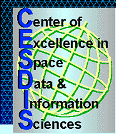


CESDIS is one member of a team currently working together with NIST and the Law Library of Congress to develop a Global Legal Information Network. The Law Library of Congress has developed a basic viable prototype of an international networked computer information system, which can provide necessary global legal information services. This networked information system addresses the need for member countries to rationalize and harmonize their respective bodies of legal information, including statues and regulations which codifies their internal and external operating procedures. International cooperation can be greatly enhanced by such a system which can make relevant local laws and regulations mutually accessible to countries engaged in, or considering joint ventures. Examples of the laws of interest are those governing trade, narcotics, and fire arms. A powerful information system is crucial to fulfilling such a requirement.
We are developing analytic models based on queueing networks to analyze the performance of hierarchical mass storage systems. We have developed models for both host attached device and network attached device based mass storage systems. The model for the host attached device based system was validated using measurements from the production system at NASA's Center for Computational Sciences and the network attached device based system was validated using a process based simulation. The power of such analytic models comes from their predictive abilities in analyzing the performance of the systems under variations of their architecture, workload demand, and configuration. Both models were used to analyze the performance of the system under various modification and loading conditions. Currently, we are developing an object-oriented, extensible analyzer which, using a GUI to allow the user to graphically describe the mass storage system to be analyzed, dynamically generates an analytic model that is used for performance evaluation and capacity planning. The work is conducted jointly by Odysseas I. Pentakalos, a Ph.D. candidate at the University of Maryland Baltimore County, Dr. Daniel Menasce', Professor at George Mason University, Dr. Yelena Yesha, Professor at the University of Maryland Baltimore County, and Dr. Milt Halem, Chief of the Space Data and Computing Division at the Goddard Space Flight Center.
I have been instrumental in producing an approved proposal to the G-7 Summit with principle investigators being CESDIS, NIST, and CommerceNet. This project's focus will be to encourage G-7 countries to develop and demonstrate electronic commerce pilot projects that will rapidly and significantly increase industrial efficiency and global trade. CESDIS joins this collaboration to represent an academic perspective, to contribute Internet expertise, and to add expertise in digital libraries (particularly in the area of resource discovery). CESDIS will lead the development of a Global Resource Directory Service (GRDS), and will represent academic and government perspectives on access to large collections of technical and scientific data. The overall objectives of this project are to rapidly develop and demonstrate GII pilot projects on a global scale; to provide the GII users with a secure, reliable, efficient, effective, universally accessible, easy-to-use, uniform mechanism to find and access resources on the GII; to facilitate a large spectrum of resource discovery methodologies; and to provide easy maintenance and extension of GII resources.
At the request of the Library of Congress, Dr. Yesha was invited to participate on a working session "Building Strategies for a National Digital Library". CESDIS will take an active part in a rapid prototype effort in the AMERICANA Project in collaboration with the Library of Congress and several industrial partners. The prototype will be demonstrated at the Digital Library Pavilion at the Library of Congress
A project for new database technology to facilitate classification and exploratory search of the broad spectrum of available multimedia data. Many datasets are scientific, residing in conventional databases or data exchange (DX) formats. The impact of current database technology on managing scientific datasets is limited by a lack of interoperation with the growing variety of heterogeneous DX formats. Another significant problem of current database systems is insufficient modeling support for metadata as well as for spatial and temporal features, which are present in the majority of scientific applications. These limitations of existing database languages require fresh approaches toward information integration and manipulation. The goal of this project is to initiate new interactions between computer scientists, as developers of a next generation of database technology, and NASA scientists, as primary users whose applications should both specify the state-of-the-art and test its limits.
Dr. Yesha serves in various capacities on committees of numerous conferences such as:
Author: The CESDIS Administrative Branch / CESDIS An Institute of
Universities Space Research
Association,
NASA Goddard Space Flight Center, Greenbelt, Maryland.
Last revised: 25 JAN 96 moc